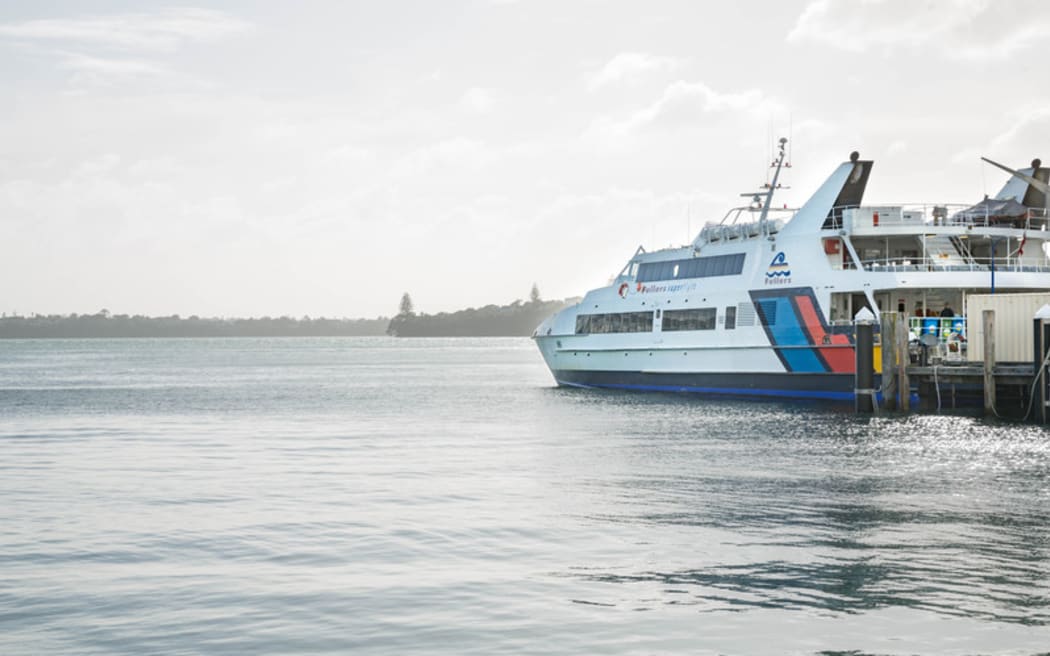
Photo: RNZ / Cole Eastham-Farrelly
In 2022, the Gulf Harbour ferry has earned the title of most cancelled service on the Auckland network. Of the 5892 trips scheduled, 2270 were cancelled.
That's 38.5 percent, and a Facebook page dedicated to Gulf Harbour ferry users is filled with frustrated posts from passengers.
Local Albany ward councillor John Watson said the ferry provides a stunning commute, but the constant cancellations were a problem.
"People can't afford to turn up and have their work or their business for the day disrupted before they've even started."
Auckland Transport group manager metro services Darek Koper said as well as ongoing crew shortages, the ferry's location made it vulnerable to cancellation as it was more exposed to rough weather than other services.
"It's exposed to different swell conditions. The further you go out northeast the conditions are often a bit different to what we have in the inner harbour."
Transport commentator and the editor of the Greater Auckland blog, Matt Lowrie, said if the weather was the ferry's main problem, the number of cancellations would not be declining any time soon.
"We certainly have had some rough weather in the last year or so, and that is going to be an issue going forward as well as climate change has a greater impact on weather in Auckland and around the country and the world.
"I think it's an issue that we need to think about how we design our ferry terminals."
There are now concerns the ferry's unreliability could turn people off public transport.
"A lot of effort has gone in to build up the patronage, to get people using it, to increase the services and the real concern that I've got and the people that use it is that it's deteriorated to such an extent in terms of reliability that, will eventually, you know, impact on, on commuters," Watson said.
Lowrie said even if there was a bus in the area, that may not be as attractive to commuters as the ferry.
"Even if there's capacity, the service is a much longer, less direct service compared to the ferry. So, it's likely a lot less attractive to people who are up there who might be wanting to use public transport."
He was looking forward to new ferries currently on order arriving in Auckland, but in the meantime, he wanted Auckland Transport to communicate with users about the ferry strategy.
"It would be really useful for Auckland Transport to highlight what their plans are for how ferries should operate, what kind of frequency is it that we should be expecting going forward, what kind of travel times, all those sorts of things."
Koper said there was work underway to increase crew numbers.
"We are working through with the industry, all the operators, as well as the minister and the government officials to work out the best way to develop a ferry recovery programme and a plan to resume pretty much reliable services."
On top of that, Auckland Transport is upgrading the ferry fleet, with new low emissions electric and electric hybrid ferries on the way.
In the interim, existing diesel ferries will be getting a refit.
Auckland Transport said in a statement the diesel ferries would be more mechanically resilient, although weather would remain a problem.
"These are existing vessels currently operating the Auckland harbour and have been so for many years, so in terms of more resilience to weather there is very little that can be done to make an existing ferry more resilient to poor weather conditions."
The new ferries will have improved weatherability.
"They will be larger in both volume and length than a number of existing vessels operating on the Auckland ferry network. They will also include the latest advancements and technology in maritime design elements and ride comfort.
"As above, passenger and crew safety and comfort will remain the priority," the statement said.
Until all the work is done though, users will have to make do with ferry replacement services.
Koper said most passengers on cancelled services were offered alternative transport - the preferred method was via bus, but taxis and Ubers have often been used instead to get commuters to their destination.
So, for now, Gulf Harbour residents may have to continue spending many of their mornings on the motorway, wishing they were on the harbour.

